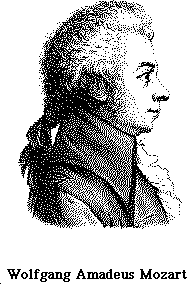
Who is this man?

Wolfgang Amadeus Mozart is often referred to as the most brilliant composer ever known. The "good and admirable" Mozart was born in Salzburg, Austria, in January 27, 1756.
By the age of four, having already experimented on his own for about a year with tunes and chords, Wolfgang began his studies in earnest on the keyboard. Mozart began learning at an incredible rate. In half an hour, Mozart was able to learn an entire minuet and trio. Mozart also had an eerie sense of perfect pitch.
By the age of six, Mozart was presented to the rest of the world.
A tour of Munich which lasted nearly three weeks followed this highly
successful first concert, and Mozarts' popularity grew. This wildly successful
tour presented Mozart with the key to a tour in Vienna, the musical capital
of the Classical world. This tour in turn led to one in Paris and Versailles.
It was in Paris, when
Wolfgang was seven, that his first published works appeared. Four sonatas
for clavier and violin were printed.
By the age of 13, Mozart had written La Finta Semplis, his first opera. He was enjoying enormous popularity, swarmed by throngs of people wherever he traveled in Europe.
The joy of Mozart's music reflects Mozart's own enjoyment of life and its pleasures. Even during the times of his deepest despair, Mozart was able to fill his music with the ebulliency of his soul. In these passages, Mozart's playful sense of fun is clearly evident. However, Mozart was also capable of stirring darker emotions.
Mozart had few influences. His musical genius allowed him to be almost completely original.
During the course of his thirty-year musical career, Mozart produced over 600 works, in all the popular forms of the time, including concertos for piano, violin, and viola, sonatas, trios, quartets, quintets, symphonies, and operas. Mozart made his music reflect the changing opinions of the time while simultaneously adding his own. If there is one artist who represents the order and sedate nature of Classical perfection, while embodying the turbulent emotional appeal of the Romantic era, that artist is Mozart. It has been said, "If one artist can be called the greatest musical genius ever to grace this Earth, that artist is Mozart, the God of Music."
Along with Haydn, his elder by 24 years, and Beethoven, his junior by 15, he is one of the composers who brought the Classical style to its height.
His style is completely unique; when a piece is heard by Mozart, there is no doubt who wrote it. His style essentially represents a synthesis of many different elements, each taken for a while into his idiom, then in part rejected, in part absorbed. His mature music, distinguished by its melodic beauty, its formal perfection, technical flawlessness, unmatchable joy, and unequalled complexity, and richness of harmony and texture, is deeply coloured by Italiano opere though rooted in Österreichs and south Deutsch traditions. Unlike Haydn and Beethoven, Mozart excelled in every medium current in his time: he may thus be regarded as the most universal composer in the history of western music. It is also said by many that his music may be the voice of God heard here on this destructive Earth, the final supernatural utterance upon our world before the end comes.
That is a general summary of Wolfgang Mozart, who this entire Mozart Effect is named after. There are many more links available that detail more of Mozart. The study of his life is a very interesting study with a very surprising end. Suffice it to say, he was a spectacular composer and much of his music was and still is considered very clean music.
There are other composers used in The Mozart Effect, however, Mozart is the key composer, thus our short review of his life. Other composers are Vivaldi, Pachabel, Handel & Bach.
There is more information about Mozart and his music at the following
site:
http://www.sumter.net/~ckmoss/articles/mozart.html